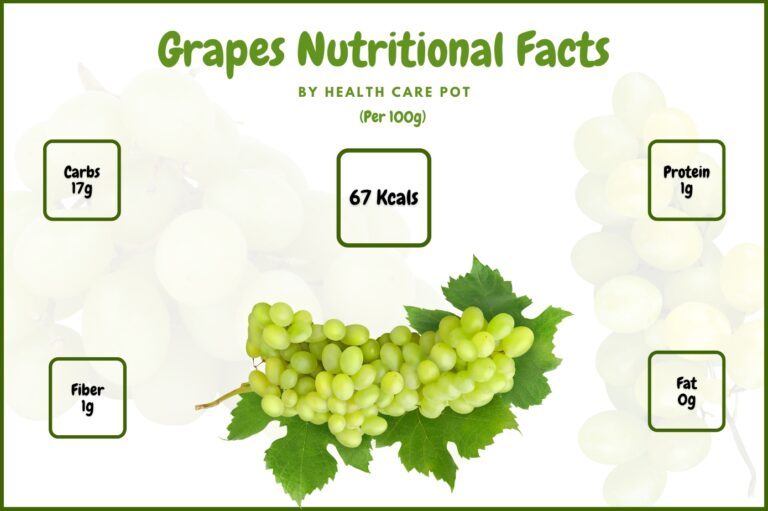Grapes hold 81% of water. It served as quick and easy-to-carry snack fruit for outside the house.
The grape's scientific name is 'Vitis'. Grapes are used commercially to make pickles, sauce, and wine.
grapes Nutrition Facts
Here below table shows raw grape's nutritional value per 100g.
Serving size 100 g
Servings per container 1 Calories from Fat 0 * Percent Daily Values are based on a 2,000 calorie diet. Your daily values may be higher or lower depending on your calorie needs.Nutrition Facts
Amount per serving
Calories 67
% Daily Value*
Total Fat 0g
0%
Saturated Fat 0g
0%
Trans Fat 0g
Cholesterol 0mg
0%
Sodium 2mg
1%
Total Carbohydrate 17g
6%
Dietary Fiber 1g
4%
Sugars 16g
Protein 1g
100 grams of grapes holds 67 Kcals, 0 grams of fat, 17 grams of carbohydrates, and 1 gram of protein.
There is no cholesterol or trans fat in the grapes. It contains 2 mg of sodium.
Calories:
100 grams of grapes have 67 Kcals(280 kJ). Most of the calories come from carbohydrates.
A 100-gram of grapes has 17 grams of carbohydrates, 1 gram of fiber, and 16 grams of natural sugar. In 100 grams of grapes, Net carbs(Total Carbs-Fiber) should be 16 grams.
There is no fat in grapes.
100 grams of raw grapes have just 1 gram of protein.
Glycemic Index:
The glycemic index of grapes is 53. Most carbohydrates it contains are sugar but don't raise your cholesterol because it is natural sugar. So it is helpful fruit for people with diabetes.
Vitamins and Minerals in Grapes
Vitamines | Content | Minerals | Content |
|---|---|---|---|
Vitamin C | 4 mg | Calcium | 14 mg |
Vitamin A | 5 mcg | Phosphorus | 10 mg |
Vitamin E | 0.19 mg | Potassium | 191 mg |
Vitamin K | 14.6 mcg | Iron | 0.29 mg |
Vitamin B1 | 0.092 mg | Magnesium | 5 mg |
Vitamin B2 | 0.057 mg | Zinc | 0.04 mg |
Vitamin B3 | 0.3 mg | Copper | 0.04 mg |
Vitamin B6 | 0.11 mg | Manganese | 0.718 mg |
Vitamin B9 | 4 mcg |
100 grams of grapes can provide you Vitamin C(4%), Vitamin A(0.55%), Vitamin E(1%) and Vitamin K(12%) of your RDA(Recommended Dietary Allowances).
Vitamin C improves immunity power, Vitamin A needed for cell growth, Vitamin E conserves healthy skin and eyes., and Vitamin K is necessary for blood clotting and healthy bones.
Grapes also hold a good amount of B vitamins. 100 grams of grapes can provide Vitamin B1(thiamin) 8%, Vitamin B2(riboflavin) 4%, Vitamin B3(niacin) 2%, Vitamin B6 (pyridoxine) 8%, and Vitamin B9(folate) 1% of your RDA(Recommended Dietary Allowances). These vitamins require for digestion and proper nerve function.
Grapes hold a good amount of minerals too. Minerals build strong bones and teeth.
100 grams of grapes can provide Calcium at 1%, Phosphorus 0.25%, Potassium 10%, Iron 2%, Magnesium 1%, Zinc 0.3%, Copper 4% and Manganese 31% of your RDA(Recommended Dietary Allowances).
Calcium maintains strong bones; Phosphorus plays a significant role in forming DNA and RNA; Potassium regulates fluid balance; Iron reduces tiredness and fatigue; Magnesium supports muscle, nerve function, and energy production.
Zinc plays a significant role in building proteins; Copper makes red blood cells; Manganese helps the body to create connective tissue, bones, and blood clotting factors.
Health Benefits Of Grapes
Served as a quick snack:
Grapes are easy to carry and delicious snacks for at home or outside the home. It is a quick snack whenever you feel hungry. Also, it is low-calorie fruit.
Helps in weight loss:
Grapes hold 81% of water, so it contains super low calories. It contains low carbs and low calories that ultimately help to lose weight. It contains an adequate amount of vitamins and minerals too.
Frequently Asked Questions(FAQ):
Grapes contain Vitamins C, E, and K that help to clear skin acne, dark sport, and wrinkles.
Well, grapes are indeed high in sugar, but all you need to know is that their sugar is a natural sugar with many more benefits.
20 green grapes(60g) hold 40Kcal. It also has 10 grams of carbohydrates, of which 9 grams is natural sugar.

